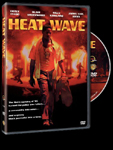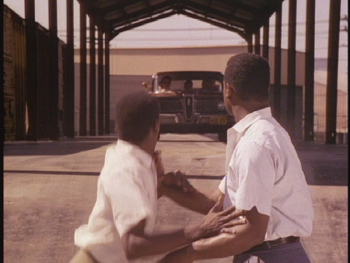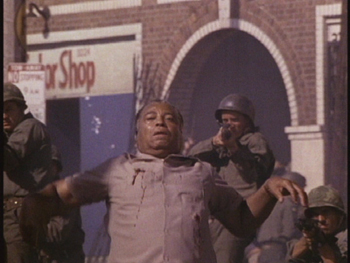
 BUY IT AT AMAZON: CLICK HERE!
BUY IT AT AMAZON: CLICK HERE!
STUDIO: Warner Bros. Home Video
MSRP: $19.98
RATED: Unrated
RUNNING TIME: 92 Minutes
SPECIAL FEATURES: Nichts
The Pitch
"We’ll take the journalist-hero schtick from All The President’s Men and add a bit of Mississippi Burning and voila! One riot."
The Humans
There’s a great cast for this show. Blair Underwood, James Earl Jones, David Straithairn, and Cicely Tyson stand out particularly.
The Nutshell
In 1965, a
At the same time, Bob Richardson, a resident from

"Oh shit! It’s [esoteric car trivia]!"
"Damn! [Further automotive banter]"
The Package
The show was originally a TNT miniseries, so it’s early 90s television quality in sound and picture, which is to say passable, but not great. It’s got a fullscreen aspect ratio and a 2.0 stereo soundtrack.
The cinematography is uniformly good, with a combination of unobtrusive and shaky hand-held stuff during the riots. The score, by Thomas Newman, features piano work that, while lacking any memorable themes, provides an effective ambience.
That’s about all I can say, though, since subtitles don’t really count as bonus features. There are subtitles, though. Subtitles enough to satisfy all your tri-lingual fantasies.

I can see you through my special telescope.
The Lowdown
It’s gotta be a challenge, turning cultural events into watchable narrative films. We audiences demand sympathetic characters to anchor the narration, but situations such as the Watts Riot are such spiderwebs of interaction, violent and otherwise, that individuals get lost in the commotion.
As in life, so in Heat Wave. Writer Michael Lazarou tried to inject a bit of biographical interest into the characters of Bob Richardson and his family, but it was kind of a lost cause. As the focus continues to widen throughout the show, the details of the characters’ lives seem less and less important, despite several attempts to re-center interest on them. In the end, the personal victories and defeats seem inconsequential next to the social implications of the rioting.
Heat Wave features some fine performances, but they don’t have enough to do. The film takes too much of a godlike perspective to really conjure any emotion other than the abstract empathy for those who lived in times past.
6.5 out of 10